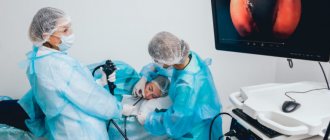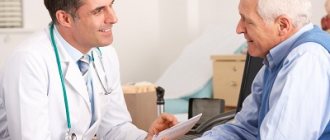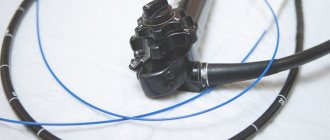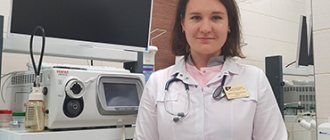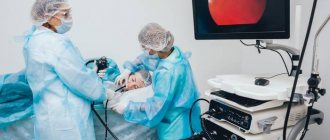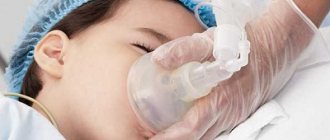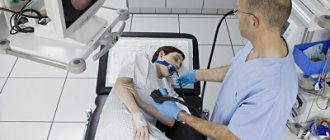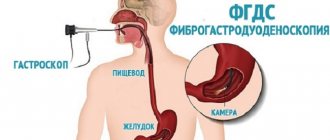Preparation for FGDS
Fibrogastroduodenoscopy is a method of examining the mucous membrane of the stomach and duodenum. With its help, erosions, ulcers of the mucous membrane, tumor processes and other pathological foci are identified.
The examination is carried out using an endoscope. The equipment is a flexible probe containing a fiber optic network inside. At the end of the probe there is a tiny video camera that transmits the captured information to the monitor screen in high resolution. This allows you to view the mucosa step by step without missing a single centimeter.
Good preparation allows for the best visibility and patency of the digestive tract for a thorough diagnosis.
Before FGDS
- Medical instruction . The attending physician will tell you what the procedure is, how long it will take, and what should be the preparation for fibrogastroduodenoscopy.
- Diet . The last meal before the procedure should be 8-12 hours before. It is necessary to eat easily digestible food. This means that you cannot eat nuts, meat products, mushrooms, chocolate, fatty foods, and spicy foods. You can have chicken and fish (boiled or steamed), buckwheat porridge and vegetables.
- Water . Before FGDS, you should not drink 2-4 hours before the procedure.
- Bad habits . Alcohol is not allowed 2-3 days before the procedure due to its local irritant effect. It is not advisable to smoke on the day of the procedure.
- Taking medications . 2 hours before the procedure, taking pills and other medications is not allowed. If there are vital medications that cannot be stopped, you must notify your doctor.
- Organizational aspects . You need to take your passport and directions with you.
On the day of the procedure
Preparation for EGD of the stomach on the day of the procedure involves quitting smoking. You should also not brush your teeth, chew gum, or eat candy. This can cause mucus to form in the stomach.
The doctor must be warned about possible poor health and the presence of allergic reactions in the past.
What diet should you follow before gastroscopy?
Typically, a doctor prescribes an examination such as FGDS for various diseases of the gastrointestinal tract (including ulcers, duodenitis, gastritis) or for suspected diseases. Also, an endoscopic examination can be prescribed if the patient has frequent pain and heaviness in the abdomen, nausea and vomiting, regular belching or persistent heartburn. Preparation for gastroscopy and timely testing are necessary to obtain accurate diagnostic results.
Contraindications
FGDS is done on the direction of the attending physician. Subsequent examination is carried out by an endoscopist. Even if there are indications for examination, the procedure can be canceled or replaced with another in a number of cases:
- an attack of epilepsy or bronchial asthma;
- pregnancy;
- serious problems with blood circulation;
- diseases of the esophagus that may cause difficulties when inserting the examination device (for example, burns, etc.).
These contraindications are absolute. There is also a group of relative contraindications:
- hypertensive crisis;
- acute cardiac or respiratory failure;
- aortic aneurysm;
- esophageal diverticulum;
- problems with the nasopharynx that cause difficulty breathing.
In these situations, the specialist decides whether it is advisable to conduct an endoscopic examination. In any case, the examination is done solely with the voluntary consent of the patient.
Preparation for gastroscopy of the stomach
- 1. Clinical (general) blood test. Allows you to detect internal inflammation in the patient’s body, anemia, and see an increased risk of bleeding when examined with a gastroscope.
- 2. Biochemical blood test. Allows you to confirm or refute the presence of internal inflammation in the body, detect infectious diseases (hepatitis B, C) and HIV infection.
- 3. General urine analysis.
In some cases, additional tests may be recommended.
Timely examination of the patient’s blood and urine allows us to detect contraindications to FGDS, which may have been previously unknown. Taking tests allows you to prevent possible negative consequences of the examination.
Remember that before the test you need to tell your doctor if you are taking any medications on an ongoing basis - some of them will need to be stopped.
Proper diet before gastroscopy
Preparing for the study is very simple - you need to start with nutrition. It is worth paying attention to your diet as early as possible.
At least two days before the procedure, you should exclude the following products:
- fatty and fried foods;
- seeds and nuts;
- chocolate;
- mayonnaise;
- foods rich in fiber;
- whole wheat bread;
- various cheeses.
You should also avoid alcohol - it will provoke a strong gag reflex.
On the eve of the test, reap light and healthy foods (for example, mashed potatoes and low-fat chicken cutlets are suitable). It is advisable that dinner be no later than six o'clock in the evening.
Preparation for gastroscopy of the stomach in the morning on the day of examination consists of completely eliminating food and any drinks. You are allowed to drink about one glass of water no later than three hours before the start of the procedure. Smokers are advised to abstain from cigarettes.
After FGDS
We hope you now know what is needed for FGDS and how to prepare for the procedure. Let's talk about how to behave after the examination:
- You can’t fast (not eat for more than a day);
- bad habits need to be put aside for a while;
- you should avoid stress and physical activity;
- You can drink water and any drinks except alcoholic drinks immediately;
- You can eat food after 30 minutes. – 1 hour after the procedure;
- You need to monitor your condition and if you experience pain, hemoptysis or other changes in your condition, consult a doctor.
Features of diet and food intake
The food after the procedure should be light in the first days - steamed, boiled. Oatmeal, yogurt, and steamed meat will do. You need to drink at least 1.5 liters of water.
Portions should be moderate, meals should be divided (5-7 meals) so as not to overload the stomach. You definitely need to eat heated (not hot!) food.
Not allowed : fatty, fried, spicy, sour, fast food, baked goods, sauces, coffee, soda. It is advisable to follow such a diet for 2-4 weeks, especially if a biopsy was performed or signs of an inflammatory process were detected.
Preparation for fibrogastroduodenoscopy (FGDS) and fibrogastroscopy (FGS)
- On the eve of the study, light dinner (no later than 19.00), from 19.00 to 24.00 you can drink (water, tea).
- On the day of the study you cannot:
- Eating;
take medications, if you are prescribed constant use of antihypertensive drugs, take them sublingually until completely absorbed (at least 2 hours before the test);
- drink liquid;
- smoke.
- In the morning, clean the mouth and nasal passages.
- Have with you:
- towel;
- results of previous studies;
- passport, medical policy, SNILS, referral to FGDS;
- Negative test for coronavirus infection (PCR) - Nasopharyngeal swab (within no more than 5 days).
If the test is scheduled after 13.00, then before 7.00 you can drink empty sweet tea (without milk, without cookies, etc.).
Necessary:
- arrive at City Hospital No. 40 40 minutes before the appointed time;
- go to the outpatient consultation department, clinic No. 68, first floor, room 131 (lunch break from 13:00 to 14:00) - fill out medical documents (prepare a passport, medical policy, SNILS, referral for research), in this office you will receive detailed information on how to get to the room where the research is being conducted;
- further, if the study is planned under anesthesia , pay for anesthesia at the cash desk for paid services at polyclinic No. 68 “for endoscopy,” room 112;
- if an HP test is prescribed, pay at the paid services desk of clinic No. 68 “for endoscopy”, room 112;
- go to the office designated during pre-registration:
A) rehabilitation building, 2nd floor, room No. 214; Or B) surgical building, 2nd floor, endoscopy department (to the right of the landing).
- check in and wait to be called for the procedure.
Anesthesia for endoscopic examination is a procedure performed by an anesthesiologist and nurse anesthetist under constant hardware monitoring of the respiratory and cardiovascular systems; This is the intravenous administration of a drug (deprivan), after which the patient falls asleep, which allows the study to be carried out without pain. At the end of the study, the patient wakes up and after 10-15 minutes, capacity is restored.
When conducting a study under anesthesia:
- be with an accompanying person;
- arrive without personal vehicles;
- have an ECG with interpretation (valid for 2 weeks).
During FGDS without general anesthesia, additional local anesthesia of the oropharynx is required by irrigation with a 10% lidocaine solution. Therefore, if you are allergic to local anesthetics, be sure to inform your endoscopist about this during your appointment.
Phone number to sign up for the study: +7 (921) 847-70-48 on weekdays from 10 a.m. to 3 p.m.
← Back
What to do before a colonoscopy?
It is necessary to cleanse the intestines. This is achieved through diet and cleansing preparation. Previously, they did an enema, but now they have moved away from this practice. Medicinal bowel cleansing is carried out.
This method is more convenient, since 3-4 enemas are required to completely cleanse the intestines, and this contributes to dysbacteriosis and is a source of significant discomfort. Instead, one of the medications prescribed by the doctor is taken according to the regimen.
Diet before colonoscopy
Two days before the procedure, if there is no constipation, the patient switches to a slag-free diet:
- Not allowed - black bread, vegetables, fruits, legumes, greens, cottage cheese.
- You can - eggs, semolina, broth, boiled (meat, sausage, fish), kefir, cheese.
On the day of the procedure - only liquid food (broth). Drinks include water and tea. You can take medications, with the exception of iron-containing drugs, antiplatelet agents (aspirin), anticoagulants (warfarin) and sorbents (activated carbon).
After colonoscopy
If the procedure is performed under anesthesia, the patient must be picked up from the clinic after a couple of hours by an accompanying person. If this is not possible, you should not go home on your own. It is better to use a taxi.
After the procedure you should avoid:
- heavy foods, coffee, alcohol;
- transport management;
- dangerous sports;
- significant physical activity;
- work that requires increased attention.
You can eat and drink only 40-60 minutes after the examination.
Diet - gentle, fractional, fortified:
- Smoked meats, canned food, sweets, chocolate, and bread other than bran are not allowed
- You can eat low-fat fish, cottage cheese, yogurt, kefir, milk, steamed vegetables and fruits.
For the fastest rehabilitation at home, you need to follow a gentle regimen and monitor your condition (if you have a fever and pain, consult a doctor). In some cases, herbal medicine and medications are prescribed. Do not take aspirin or warfarin (they interfere with blood clotting). You must follow medical recommendations.
How to prepare at home?
Preparing for FGS of the stomach at home involves proper nutrition. A well-structured diet will help prepare the stomach cavity for examination.
It is best for an adult to prepare a week before the scheduled procedure. To do this, you should exclude the following foods from your diet:
- bread and flour products, including pasta;
- fatty and fried foods;
- semi-finished products;
- fish and fatty meat;
- smoked meats;
- spicy and canned foods;
- mayonnaise, ketchup and other sauces;
- alcoholic drinks.

If the examination is scheduled for tomorrow, then it will be enough to exclude dinner at a later time and eat your last meal 12 hours before the procedure. During this time, the stomach will have time to digest the food that has entered it. Digestion takes 8 hours, but since human metabolism slows down at night, foods are also digested more slowly. It is for this reason that the difference between food intake and examination should be at least 12 hours.
All men over 40 are recommended to undergo regular prostate ultrasound. The study is done in any medical institution and does not require much time, the main thing is to properly prepare for it. Read more in the article: “preparing for an ultrasound of the prostate gland.”

If this recommendation is not followed, then the remaining food in the stomach will interfere and may regurgitate during the procedure.
To make dinner easily digestible and nutritious, you can prepare the following dishes:
- buckwheat porridge;
- steamed or boiled vegetables;
- steamed cutlets;
- lean meat, such as chicken, rabbit or fish;
- mashed potatoes.
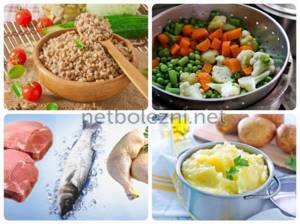
Do not eat too hot or cold food; it is recommended to exclude raw vegetables and fruits. It is also not recommended to eat chocolate the day before the test.
Cough is a reaction of the respiratory system to external or internal irritants. It can be of different types: dry, wet or with sputum, paroxysmal and even with a gag reflex. Read more in the article: “dry paroxysmal cough in an adult.”
Preparing for an X-ray of the intestines
X-ray of the intestine allows you to obtain comprehensive information about the condition and patency of the large, small intestine and appendix. An examination is prescribed if tumors, polyps or other gastrointestinal problems are suspected.
Modern intestinal X-ray is a safe, non-invasive procedure. During this procedure, the patient may be given an enema with a radiopaque substance (usually barium). The drug is harmless, cases of allergies are extremely rare. The radiation intensity is selected individually, depending on the age and health status of the patient.
Before the procedure, you must follow the recommendations as for a colonoscopy.:
- provide plenty of fluids and a slag-free diet;
- take medication prescribed by your doctor to cleanse the intestines before the x-ray;
- or perform several cleansing enemas.
On the day of the procedure:
- metal jewelry and things (dentures, body crosses) are removed;
- if you have implants or are allergic to anything, you need to tell your doctor about it.
After the procedure, no particular discomfort is observed. So no pain relief or rehabilitation is required. An enema may be necessary as barium causes constipation.
Preparation on the day of the examination
On the day of the FGDS, you should also prepare. One of the important recommendations is to temporarily refuse water on the day of the procedure. The examination is usually carried out in the morning, so this rule will not affect the general condition in any way. If you still need to take regular medication or are very thirsty, you are allowed to drink water at least 3 hours before the examination, but not more than half a glass.
Smoking is also prohibited when preparing for FGS.
Nicotine can increase salivation, which affects the results of the study. In this regard, in the morning it is advised to breathe more fresh air and not smoke.

Here are some more important recommendations:
- Clothing should be comfortable and loose, without tight belts.
- Breathe correctly through your mouth. Inhalation and exhalation should not be sharp, but smooth.
- Try not to worry.
Gastroscopy of the stomach is an unpleasant but safe procedure. Proper breathing will reduce discomfort, and loose-fitting clothing will relieve panic attacks.


